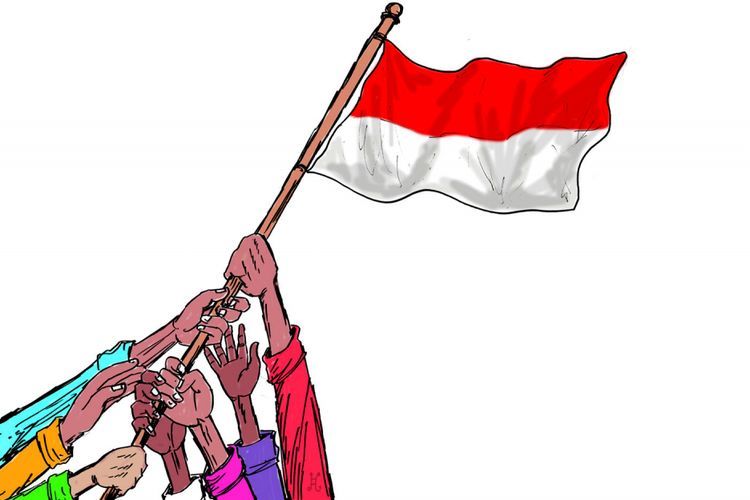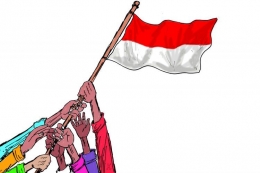Democracy comes from the Greek democracy. The word "democratia" is derived from the word demos which means people and kratein which means to rule, kratia: government. Democracy is a form of government with the supervision of the people. Democracy, in a certain sense, can mean the supervision of social institutions by and for the benefit of the people.
During the reign of Ancient Rome, representatives of the people were slowly coming to strengthen the democratic system. Modern democracy, in effect, was driven by the Puritan Revolution in England, the American Revolution and the French Revolution. The influential figures in the development of democracy were John Locke, Jean Jaques Rousseau, and Thomas Jefferson (A. G. Pringgodigdo, 1973: 301).
Democracy is a system of government that recognizes the right of all members of society to influence political decisions, either directly or indirectly. It is said directly that a political decision is determined by society in a joint meeting. Related to this, German philosopher and sociologist Jurgen Habermas will explore more deeply in his writing entitled Deliberative Democracy (2010).
Democracy comes from the Greek demos: people and kratia: government. In a democratic system, the House of Representatives is used as the People's Representative to express their opinion where decisions are taken based on the most votes, are held regularly, voting rights are owned by every citizen, and minorities are considered important in democracy (Said Rusli, 1989: 293).
In the Greek classic entitled Polis, it is said that democracy is the name of a constitution (system of government) in which poorer people can use their power to defend their interests which are often different from those of the rich and aristocratic. This nature of Greek democracy certainly implies what we call the practice of representation (Kenneth Minogue, 2000: 214).
In its basic direction, a democratic government must have aspirations or hopes to be achieved. The ideal of a democracy is the government of the people, by the people, and for the people who are immersed in the principle of representative-participatory. However, the facts for now speak differently about this representation. People sometimes suffer from the actions of their representatives who are too loyal and obedient to their party's policies. When people's representatives submit to the policies of their party, they are automatically ignored.
The principle of democracy (for the state and for every human assembly) is the recognition and acceptance of fellow human beings as persons or individuals. In a democracy, humans look to each other (to seek), accept (to receive), and cooperate (cooperate) as individuals. The democratic state is not only a government affair, but the business of all subjects of a single diversity consisting of all members who are declared in it. In principle, a democracy is not driven from or outside (such as a colony). Democracy is self-employment. Not being ruled but commanding, meaning moving oneself towards a goal. The government is responsible, the people judge. Judging means holding criticism. So, the government and the people have a dialogue. Governments that reject dialogue are dictators.
In my opinion, the principle of dialogue in a democratic country must be lived out so that all the space for a state to live is transparent and just. A government that rejects dialogue is none other than a dictator. In fact, in a democratic country, the consensus between the people and the government is about how democracy can grow, develop, and produce good fruits such as common welfare.
According to the 2013 Global Democracy Ranking, the quality of Indonesian democracy is not in the best rank. Indonesia's ranking at that time was in the medium category, at 66th, under Thailand (65) and above India (67). The ones in the good category are Norway, Sweden, Finland, Switzerland, Germany, the Netherlands, and Denmark. The barrier to the quality of democracy in Indonesia (flawed democracy) is money politics. This is true in all institutions. The practice of money politics is the most dangerous obstacle in building a democratic state.
The deepest foundation of democracy is equality (galite). If we agree with this presupposition of equality, then democracy will become a political ideal in which fellow citizens are equal, involved with each other, and without setting any goals, because equality is not the goal that is sought, but the starting point. Thus, democracy must start from galite.
Democracy is a discourse that opens up as wide a space as possible for anyone who wants to participate in it. Any subject who is able to speak and act may participate in discourse - no one is exempted. So, in a democratic country, the majority versus minority principle project is something that needs to be removed. "There is no stranger in democracy."









